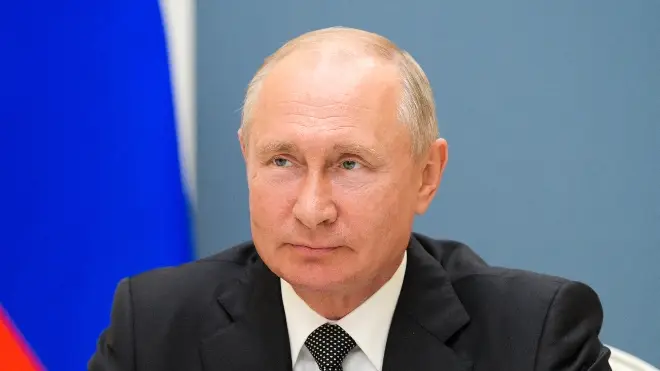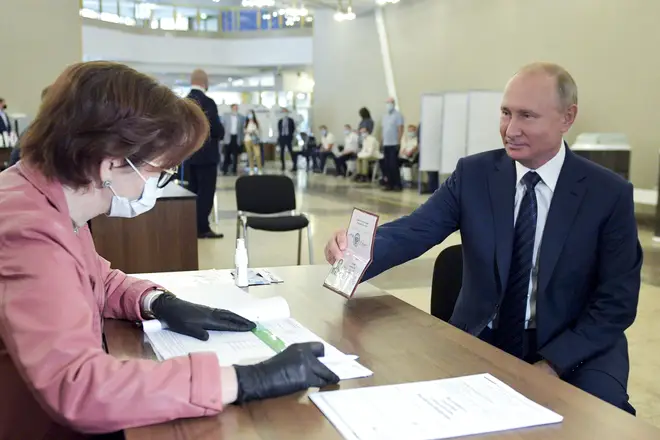
Henry Riley 3pm - 6pm
1 July 2020, 22:17

The people of Russia have voted to approve amendments to their constitution which would allow President Vladimir Putin to hold power until 2036.
More than half of the country's precincts have so far been counted, with 77 per cent voting for the historic change, according to election officials.
The sweeping reforms would reset Mr Putin's term limits to zero in 2024, the year of the next Russian election, allowing him to serve two more six-year terms.
However, the referendum has been overshadowed by widespread reports of pressure on voters and other irregularities.
For the first time in Russia, polls were kept open for a week to bolster turnout amid the coronavirus pandemic - a provision that Kremlin critics denounced as an extra tool to manipulate the ballot's outcome.
Mr Putin's propaganda campaign and the opposition's failure to mount a coordinated challenge helped the Russian leader secure the outcome he desired, but the plebiscite could end up eroding his position because of the unconventional methods used to boost participation and the dubious legal basis for the balloting.
Read more: PM offers route to UK for Hong Kong residents in wake of controversial new Chinese law
Read more: 'Annexation would represent a violation of international law' PM warns Israel over plans

On Russia's easternmost Chukchi Peninsula, nine hours ahead of Moscow, officials quickly announced full preliminary results showing 80 per cent of voters supported the amendments, and in other parts of the Far East, they said over 70 per cent of voters backed the changes.
Although, Kremlin critics and independent election observers questioned official figures.
"We look at neighbouring regions, and anomalies are obvious - there are regions where the turnout is artificially (boosted), there are regions where it is more or less real," Grigory Melkonyants, co-chairman of the independent election monitoring group Golos said.
Mr Putin voted at a Moscow polling station on Wednesday, showing his passport to the election worker. His face was uncovered, unlike most of the other voters who were offered free masks at the entrance.
The vote completes a complex saga that began in January when Mr Putin first proposed the constitutional changes.

Expert reveals what the new China laws mean for Hong Kong
He offered to broaden the powers of parliament and redistribute authority among the branches of government, stoking speculation he might seek to become Parliamentary Speaker or Chairman of the State Council when his presidential term ends in 2024.
His intentions became clear only hours before a vote in parliament, when legislator Valentina Tereshkova, a Soviet-era cosmonaut who was the first woman in space in 1963, proposed letting him run two more times.
The amendments, which also emphasise the primacy of Russian law over international norms, outlaw same-sex marriages and mention "a belief in God" as a core value, were quickly passed by the Kremlin-controlled legislature.
Mr Putin, who has been in power for more than two decades - longer than any other Kremlin leader since Soviet dictator Joseph Stalin - said he would decide later whether to run again in 2024.
He argued that resetting the term count was necessary to keep his lieutenants focused on their work instead of "darting their eyes in search for possible successors".

Sir Malcolm Rifkind: "It is a very grim day indeed for Hong Kong"
Analyst Gleb Pavlovsky, a former Kremlin political consultant, said Mr Putin's push to hold the vote despite the fact that Russia has thousands of new coronavirus infections each day reflected his potential vulnerabilities.
"Putin lacks confidence in his inner circle and he's worried about the future," Mr Pavlovsky said.
"He wants irrefutable proof of public support."
Even though the parliament's approval was enough to make it law, the 67-year-old Russian president put his constitutional plan to voters in a bid to showcase his broad support and add a democratic veneer to the changes.
But following the devastating coronavirus pandemic that engulfed Russia, it forced him to postpone the 22 April plebiscite.
The delay made Mr Putin's campaign blitz lose momentum and left his constitutional reform plan hanging as the damage from the virus mounted and public discontent grew.
Plummeting incomes and rising unemployment during the outbreak have dented his approval ratings, which sank to 59 per cent, the lowest level since he came to power, according to the Levada Center, Russia's top independent pollster.